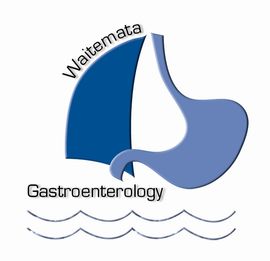Central Auckland, East Auckland, North Auckland, South Auckland, West Auckland > Private Hospitals & Specialists >
Waitematā Gastroenterology
Private Service, Gastroenterology & Hepatology (Liver)
Description
Waitematā Gastroenterology
We are a group of gastroenterologists working together in both public and private practice to offer a complete service for gastrointestinal and liver problems.
We have all had overseas advanced training, primarily in the UK, and are experienced in a full range of procedures and conditions including: gastroscopy, colonoscopy, pill camera endoscopy, inflammatory bowel disease, coeliac disease, gastro-oesophageal reflux, pH monitoring, liver diseases, irritable bowel syndrome, Hydrogen Breath testing, GI motility problems, nutritional disease and HALO therapy for Barrett’s oesophagus.
What is Gastroenterology?
Gastroenterology is the branch of medicine that looks at diseases of the oesophagus (gullet), stomach, small and large intestines (bowel), liver, gallbladder and pancreas.
The oesophagus is the tube that joins your mouth with your stomach. It is a muscular tube that contracts to push the food through when you swallow.
The stomach is where food is broken down by acid and emptied into your intestines. The stomach has special cells lining its wall to protect it from these acids.
The intestines consist of the small intestine (duodenum, jejunum and ileum – different sections of small intestine) and the large intestine (colon). As food passes through the small intestine, nutrients are broken down and absorbed. When it passes into the colon, water is absorbed. The waste that is left is passed as faeces (poo).
The liver is roughly the size of a football and is on your right side just under your ribs. It stores vitamins, sugar and iron which are used by cells in the body for energy. It also clears the body of waste products and drugs, produces substances that are used to help blood clot and aid the immune system, and produces bile which aids in digestion.
The pancreas is an elongated organ that lies in the back of the mid-abdomen. It is responsible for producing digestive juices and certain hormones, including insulin, the main hormone responsible for regulating blood sugar.
A gastroenterologist is a doctor specialising in the field of medicine which involves these closely related organs.
Consultants
Note: Please note below that some people are not available at all locations.
-

Dr Stephen Burmeister
Gastroenterologist / Endoscopist
Available at 53 Lincoln Road, Henderson, Auckland, 7 Anzac Street, Takapuna
-

Dr Carl Freyer
Gastroenterologist , Endoscopist
Available at 53 Lincoln Road, Henderson, Auckland, Northern Clinic - Southern Cross North Harbour Campus, 212 Wairau Road, Wairau Valley, Auckland, Apollo Health & Wellness, 119 Apollo Drive, Rosedale, Auckland
-

Dr Ali Jafer
Gastroenterologist / Endoscopist
Available at 2 Montel Avenue, Henderson, Auckland, 53 Lincoln Road, Henderson, Auckland, 7 Anzac Street, Takapuna
-

Dr Ratna Pandey
Gastroenterologist/ Endoscopist
Available at 13-15 Bute Road, Browns Bay, Auckland, 53 Lincoln Road, Henderson, Auckland
-

Dr John Perry
Gastroenterologist, Endoscopist, Hepatology Lead
Available at Westgate Medical Centre, 13E Maki Street, Westgate, Auckland, Silverdale Medical Centre, 7 Polarity Rise, Silverdale, Auckland, 7 Anzac Street, Takapuna
-

Dr Clare Russell
Gastroenterologist/Endoscopist
Available at Northcare, 5 Home Place, Rosedale, Auckland, 53 Lincoln Road, Henderson, Auckland, Northern Clinic - Southern Cross North Harbour Campus, 212 Wairau Road, Wairau Valley, Auckland
-

Dr Cameron Schauer
Gastroenterologist/Endoscopist
Available at 53 Lincoln Road, Henderson, Auckland, 326 Sunset Road, Mairangi Bay, Auckland, Northern Clinic - Southern Cross North Harbour Campus, 212 Wairau Road, Wairau Valley, Auckland
-

Dr Marius Van Rijnsoever
Gastroenterologist
Available at 53 Lincoln Road, Henderson, Auckland, 7 Anzac Street, Takapuna
-

Dr Russell Walmsley
Gastroenterologist / Endoscopist
Available at 7 Anzac Street, Takapuna
Referral Expectations
We welcome referrals to the group, or individually. We can also offer early appointments for urgent cases.
Your GP will refer you to us if they are concerned that you have problems that require a specialist opinion regarding the diagnosis or treatment of the condition. Your GP may also refer you directly to us for endoscopy tests (this is using a special flexible fibre optic tube to examine your stomach or bowel under sedation - see below).
Before coming to see us, you may be asked to undergo tests such as blood tests, urine tests or stool/faeces tests (you collect a sample of your urine or poo for analysis).
At your appointment a history of your symptoms will be taken as well as a review of any medications you are on (please bring these with you). You will then be examined which may involve, depending on your complaints, a rectal examination. This involves the insertion of the doctor’s finger or a tube into your bottom to examine the inside.
You may be referred on for further radiology tests, depending on your condition, such as ultrasound, Computerised Tomography (CT) or Magnetic Resonance Imaging (MRI) scans.
Common Conditions / Procedures / Treatments
This is a procedure which allows the doctor to see inside your oesophagus, stomach, and the first part of the small intestine (duodenum) and examine the lining directly. What to expect The gastroscope is a plastic-coated tube about as thin as a ballpoint pen and is flexible. It has a tiny camera attached that sends images to a viewing screen. During the test you will swallow the tube but the back of your throat is sprayed with anaesthetic so you don’t feel this. You will be offered a sedative (medicine that will make you sleepy but is not a general anaesthetic) as well. If the doctor sees any abnormalities they can take a biopsy (a small piece of tissue) to send to the laboratory for testing. This is not a painful procedure and will be performed at our endoscopy suite within Southern Cross North Harbour private hospital by a specialist doctor with nurses assisting. Complications from this procedure are very rare but can occur. They include: bleeding after a biopsy, if performed an allergic reaction to the sedative or throat spray perforation (tearing) of the stomach with the instrument (this is a serious but extremely rare complication). Before the procedure Full information will be sent to you to read in advance, but in short: you will be asked not to eat anything from about four hours before the procedure and you may need to stop some of your medications on the day of the procedure. You will have the chance to ask questions of the nurse and doctor plus watch a video of the procedure beforehand if you wish. After the procedure You will stay in the day stay unit until the sedation has worn off which usually takes 1-2 hours. You will be given something to eat or drink before you go home. If you have been sedated, you are not to drive until the following day. You will be given a full written report and explanation before you return home. If biopsies are taken these will be sent for analysis and results are available within a week. A report and copies of these are sent to your GP.
This is a procedure which allows the doctor to see inside your oesophagus, stomach, and the first part of the small intestine (duodenum) and examine the lining directly. What to expect The gastroscope is a plastic-coated tube about as thin as a ballpoint pen and is flexible. It has a tiny camera attached that sends images to a viewing screen. During the test you will swallow the tube but the back of your throat is sprayed with anaesthetic so you don’t feel this. You will be offered a sedative (medicine that will make you sleepy but is not a general anaesthetic) as well. If the doctor sees any abnormalities they can take a biopsy (a small piece of tissue) to send to the laboratory for testing. This is not a painful procedure and will be performed at our endoscopy suite within Southern Cross North Harbour private hospital by a specialist doctor with nurses assisting. Complications from this procedure are very rare but can occur. They include: bleeding after a biopsy, if performed an allergic reaction to the sedative or throat spray perforation (tearing) of the stomach with the instrument (this is a serious but extremely rare complication). Before the procedure Full information will be sent to you to read in advance, but in short: you will be asked not to eat anything from about four hours before the procedure and you may need to stop some of your medications on the day of the procedure. You will have the chance to ask questions of the nurse and doctor plus watch a video of the procedure beforehand if you wish. After the procedure You will stay in the day stay unit until the sedation has worn off which usually takes 1-2 hours. You will be given something to eat or drink before you go home. If you have been sedated, you are not to drive until the following day. You will be given a full written report and explanation before you return home. If biopsies are taken these will be sent for analysis and results are available within a week. A report and copies of these are sent to your GP.
- bleeding after a biopsy, if performed
- an allergic reaction to the sedative or throat spray
- perforation (tearing) of the stomach with the instrument (this is a serious but extremely rare complication).
Before the procedure
Full information will be sent to you to read in advance, but in short: you will be asked not to eat anything from about four hours before the procedure and you may need to stop some of your medications on the day of the procedure. You will have the chance to ask questions of the nurse and doctor plus watch a video of the procedure beforehand if you wish.
You will be given a full written report and explanation before you return home. If biopsies are taken these will be sent for analysis and results are available within a week. A report and copies of these are sent to your GP.
This is a procedure which allows the doctor to see inside your large bowel and examine the surfaces directly and take biopsies (samples of tissue) if needed. Removal of polyps and treatment of bleeding or piles can also be undertaken. What to expect The colonoscope is a flexible plastic-coated tube a little thicker than a ballpoint pen which has a tiny camera attached that sends images to a viewing screen. You will be given a sedative (medicine that will make you sleepy but is not a general anaesthetic). The tube is passed into the rectum (bottom) and gently moved along the large bowel. The procedure takes on average 30mins and your oxygen levels and heart rhythm are monitored throughout. The procedure is performed in a purpose built endoscopy theatre. Before the procedure Full written information will be sent to you, but in short: you will need to follow a special diet and take some laxatives (medicine to make you go to the toilet) over the days leading up to the test. You may be asked to stop or reduce some of your medications before the test. You will be fasting for about four hours before the test. Risks of a colonoscopy are rare but include: bleeding if a biopsy is performed allergic reaction to the sedative perforation (tearing) of the bowel wall.
This is a procedure which allows the doctor to see inside your large bowel and examine the surfaces directly and take biopsies (samples of tissue) if needed. Removal of polyps and treatment of bleeding or piles can also be undertaken. What to expect The colonoscope is a flexible plastic-coated tube a little thicker than a ballpoint pen which has a tiny camera attached that sends images to a viewing screen. You will be given a sedative (medicine that will make you sleepy but is not a general anaesthetic). The tube is passed into the rectum (bottom) and gently moved along the large bowel. The procedure takes on average 30mins and your oxygen levels and heart rhythm are monitored throughout. The procedure is performed in a purpose built endoscopy theatre. Before the procedure Full written information will be sent to you, but in short: you will need to follow a special diet and take some laxatives (medicine to make you go to the toilet) over the days leading up to the test. You may be asked to stop or reduce some of your medications before the test. You will be fasting for about four hours before the test. Risks of a colonoscopy are rare but include: bleeding if a biopsy is performed allergic reaction to the sedative perforation (tearing) of the bowel wall.
Full written information will be sent to you, but in short: you will need to follow a special diet and take some laxatives (medicine to make you go to the toilet) over the days leading up to the test. You may be asked to stop or reduce some of your medications before the test. You will be fasting for about four hours before the test.
- bleeding if a biopsy is performed
- allergic reaction to the sedative
- perforation (tearing) of the bowel wall.
This is inflammation of the liver, commonly caused by viruses. Hepatitis B and C are viruses that can cause chronic (long term) inflammation and damage to the liver. These viruses are passed from person to person through body fluids. For more information about Hepatitis B and C and their treatment see https://www.hepatitisfoundation.org.nz/ Alcohol can affect the liver and cause inflammation which, in the long term, can damage the liver permanently. Excess weight, cholesterol and diabetes can also cause fatty liver which may in some cases cause hepatitis or inflammation in the liver.
This is inflammation of the liver, commonly caused by viruses. Hepatitis B and C are viruses that can cause chronic (long term) inflammation and damage to the liver. These viruses are passed from person to person through body fluids. For more information about Hepatitis B and C and their treatment see https://www.hepatitisfoundation.org.nz/ Alcohol can affect the liver and cause inflammation which, in the long term, can damage the liver permanently. Excess weight, cholesterol and diabetes can also cause fatty liver which may in some cases cause hepatitis or inflammation in the liver.
Alcohol can affect the liver and cause inflammation which, in the long term, can damage the liver permanently.
Excess weight, cholesterol and diabetes can also cause fatty liver which may in some cases cause hepatitis or inflammation in the liver.
Cirrhosis is the term used to describe a diseased liver that has been badly scarred, usually due to many years of injury. Many people who have developed cirrhosis have no symptoms or have only fatigue, which is very common. However, as the cirrhosis progresses, symptoms often develop as the liver is no longer able to perform its normal functions. Symptoms include: swollen legs and an enlarged abdomen easy bruising and bleeding frequent bacterial infections malnutrition, especially muscle wasting in the temples and upper arms jaundice (a yellow tinge to the skin and eyes). Cirrhosis is diagnosed using a number of tests including: blood tests, ultrasound scans and a biopsy of the liver. Treatment options depend on the severity of damage to the liver and include dietary changes and avoidance of substances such as alcohol that can further damage the liver. Medication may be given to prevent complications and treat symptoms of liver failure. There is no cure other than liver transplantation.
Cirrhosis is the term used to describe a diseased liver that has been badly scarred, usually due to many years of injury. Many people who have developed cirrhosis have no symptoms or have only fatigue, which is very common. However, as the cirrhosis progresses, symptoms often develop as the liver is no longer able to perform its normal functions. Symptoms include: swollen legs and an enlarged abdomen easy bruising and bleeding frequent bacterial infections malnutrition, especially muscle wasting in the temples and upper arms jaundice (a yellow tinge to the skin and eyes). Cirrhosis is diagnosed using a number of tests including: blood tests, ultrasound scans and a biopsy of the liver. Treatment options depend on the severity of damage to the liver and include dietary changes and avoidance of substances such as alcohol that can further damage the liver. Medication may be given to prevent complications and treat symptoms of liver failure. There is no cure other than liver transplantation.
- swollen legs and an enlarged abdomen
- easy bruising and bleeding
- frequent bacterial infections
- malnutrition, especially muscle wasting in the temples and upper arms
- jaundice (a yellow tinge to the skin and eyes).
Cirrhosis is diagnosed using a number of tests including: blood tests, ultrasound scans and a biopsy of the liver.
Treatment options depend on the severity of damage to the liver and include dietary changes and avoidance of substances such as alcohol that can further damage the liver. Medication may be given to prevent complications and treat symptoms of liver failure. There is no cure other than liver transplantation.
There are two main types of IBD; ulcerative colitis and Crohn’s disease. In these conditions, the immune system attacks the lining of the colon causing inflammation and ulceration, bleeding and diarrhoea. In ulcerative colitis this only involves the large intestine, whereas in Crohn’s disease areas within the entire intestine can be involved. Both diseases are chronic (long term) with symptoms coming (relapse) and going (remission) over a number of years. Symptoms depend on what part of the intestine is involved but include: abdominal pain diarrhoea with bleeding tiredness fevers infections around the anus (bottom) weight loss can occur if the condition has been present for some time. Diagnosis is made when the symptoms, examination and blood tests suggest inflammatory bowel disease, infection is ruled out, and you undergo a colonoscopy with biopsy. Treatment depends on the severity of the symptoms and what part of the intestine is affected. Medication is aimed at suppressing the immune system, which is harming the lining of the bowel. This is done via oral or intravenous medication as well as medication given as suppositories or an enema (via the bottom). Other treatments include changes in the diet to optimise nutrition and health. Treatment in some cases requires surgery to remove affected parts of the bowel. For more information see http://crohnsandcolitis.org.nz/
There are two main types of IBD; ulcerative colitis and Crohn’s disease. In these conditions, the immune system attacks the lining of the colon causing inflammation and ulceration, bleeding and diarrhoea. In ulcerative colitis this only involves the large intestine, whereas in Crohn’s disease areas within the entire intestine can be involved. Both diseases are chronic (long term) with symptoms coming (relapse) and going (remission) over a number of years. Symptoms depend on what part of the intestine is involved but include: abdominal pain diarrhoea with bleeding tiredness fevers infections around the anus (bottom) weight loss can occur if the condition has been present for some time. Diagnosis is made when the symptoms, examination and blood tests suggest inflammatory bowel disease, infection is ruled out, and you undergo a colonoscopy with biopsy. Treatment depends on the severity of the symptoms and what part of the intestine is affected. Medication is aimed at suppressing the immune system, which is harming the lining of the bowel. This is done via oral or intravenous medication as well as medication given as suppositories or an enema (via the bottom). Other treatments include changes in the diet to optimise nutrition and health. Treatment in some cases requires surgery to remove affected parts of the bowel. For more information see http://crohnsandcolitis.org.nz/
- abdominal pain
- diarrhoea with bleeding
- tiredness
- fevers
- infections around the anus (bottom)
- weight loss can occur if the condition has been present for some time.
Irritable Bowel Syndrome (IBS) is a very common disorder of the stomach and bowel due to disordered movement or motility. Up to one in five people can be affected. It may be triggered by infections or arise without obvious cause. Common symptoms include: Abdominal pain which often eases after going to the toilet Diarrhoea or constipation or both Feeling bloated Passing mucus Feeling of urgently needing to go to the toilet Other symptoms may include: Loss of appetite Nausea or vomiting Tiredness Excessive wind Pain during sexual intercourse Intolerance of certain foods It is not normal to pass blood if you have IBS. If this happens you should consult with your doctor. Diagnosis is made after a full consultation of your history, examination and relevant blood or stool tests. Often it is necessary to exclude infections or inflammatory bowel disease by performing a colonoscopy test (see above). Sometimes ultrasound or Xray tests are performed. Irritable bowel syndrome does not lead to cancer and is usually treatable with changes to diet, lifestyle and use of some medications. A comprehensive assessment by our gastroenterologists and dietitian will definitely help this condition.
Irritable Bowel Syndrome (IBS) is a very common disorder of the stomach and bowel due to disordered movement or motility. Up to one in five people can be affected. It may be triggered by infections or arise without obvious cause. Common symptoms include: Abdominal pain which often eases after going to the toilet Diarrhoea or constipation or both Feeling bloated Passing mucus Feeling of urgently needing to go to the toilet Other symptoms may include: Loss of appetite Nausea or vomiting Tiredness Excessive wind Pain during sexual intercourse Intolerance of certain foods It is not normal to pass blood if you have IBS. If this happens you should consult with your doctor. Diagnosis is made after a full consultation of your history, examination and relevant blood or stool tests. Often it is necessary to exclude infections or inflammatory bowel disease by performing a colonoscopy test (see above). Sometimes ultrasound or Xray tests are performed. Irritable bowel syndrome does not lead to cancer and is usually treatable with changes to diet, lifestyle and use of some medications. A comprehensive assessment by our gastroenterologists and dietitian will definitely help this condition.
Irritable Bowel Syndrome (IBS) is a very common disorder of the stomach and bowel due to disordered movement or motility. Up to one in five people can be affected. It may be triggered by infections or arise without obvious cause.
Common symptoms include:
- Abdominal pain which often eases after going to the toilet
- Diarrhoea or constipation or both
- Feeling bloated
- Passing mucus
- Feeling of urgently needing to go to the toilet
Other symptoms may include:
- Loss of appetite
- Nausea or vomiting
- Tiredness
- Excessive wind
- Pain during sexual intercourse
- Intolerance of certain foods
It is not normal to pass blood if you have IBS. If this happens you should consult with your doctor.
Diagnosis is made after a full consultation of your history, examination and relevant blood or stool tests. Often it is necessary to exclude infections or inflammatory bowel disease by performing a colonoscopy test (see above). Sometimes ultrasound or Xray tests are performed.
Irritable bowel syndrome does not lead to cancer and is usually treatable with changes to diet, lifestyle and use of some medications. A comprehensive assessment by our gastroenterologists and dietitian will definitely help this condition.
Gastro-oesophageal reflux disease (GORD) is the medical term for the common symptoms of heartburn, reflux or indigestion. Up to 20% of the NZ population suffer from this problem either intermittently or continually. GORD is usually worse in smokers, the overweight and those with a hiatus hernia. It can even mimic angina or heart pain. Untreated, GORD can lead to permanent damage or scarring to the oesophagus (food pipe). Ulcers can form with bleeding also occurring. Barretts oesophagus (a change in the lining of the lower food pipe) is a cancer risk and can only be detected by gastroscopy examination. Gastroscopy may be indicated in people who have: Symptoms not well controlled with antacids Frequent vomiting, including bringing up blood Regurgitation of food after eating or bending Difficulty swallowing solid or chunky food A family history of oesophageal or stomach cancer Known Barretts oesophagus. Normally, treatment of reflux symptoms is very successful and can avoid ongoing discomfort or serious problems. Medications usually control or fix the problem, but sometimes surgical repair of hiatus hernia is needed. Our practice offers a comprehensive service including gastroenterologists, dietitians, surgeons, gastroscopy or specialised tests if required such as pH testing and oesophageal manometry.
Gastro-oesophageal reflux disease (GORD) is the medical term for the common symptoms of heartburn, reflux or indigestion. Up to 20% of the NZ population suffer from this problem either intermittently or continually. GORD is usually worse in smokers, the overweight and those with a hiatus hernia. It can even mimic angina or heart pain. Untreated, GORD can lead to permanent damage or scarring to the oesophagus (food pipe). Ulcers can form with bleeding also occurring. Barretts oesophagus (a change in the lining of the lower food pipe) is a cancer risk and can only be detected by gastroscopy examination. Gastroscopy may be indicated in people who have: Symptoms not well controlled with antacids Frequent vomiting, including bringing up blood Regurgitation of food after eating or bending Difficulty swallowing solid or chunky food A family history of oesophageal or stomach cancer Known Barretts oesophagus. Normally, treatment of reflux symptoms is very successful and can avoid ongoing discomfort or serious problems. Medications usually control or fix the problem, but sometimes surgical repair of hiatus hernia is needed. Our practice offers a comprehensive service including gastroenterologists, dietitians, surgeons, gastroscopy or specialised tests if required such as pH testing and oesophageal manometry.
Gastro-oesophageal reflux disease (GORD) is the medical term for the common symptoms of heartburn, reflux or indigestion. Up to 20% of the NZ population suffer from this problem either intermittently or continually. GORD is usually worse in smokers, the overweight and those with a hiatus hernia. It can even mimic angina or heart pain.
Untreated, GORD can lead to permanent damage or scarring to the oesophagus (food pipe). Ulcers can form with bleeding also occurring. Barretts oesophagus (a change in the lining of the lower food pipe) is a cancer risk and can only be detected by gastroscopy examination.
Gastroscopy may be indicated in people who have:
- Symptoms not well controlled with antacids
- Frequent vomiting, including bringing up blood
- Regurgitation of food after eating or bending
- Difficulty swallowing solid or chunky food
- A family history of oesophageal or stomach cancer
- Known Barretts oesophagus.
Normally, treatment of reflux symptoms is very successful and can avoid ongoing discomfort or serious problems. Medications usually control or fix the problem, but sometimes surgical repair of hiatus hernia is needed.
Our practice offers a comprehensive service including gastroenterologists, dietitians, surgeons, gastroscopy or specialised tests if required such as pH testing and oesophageal manometry.
Peptic ulcers are sores or eroded areas that form in the lining of the digestive tract. They usually occur in the stomach (gastric ulcer) or in the duodenum (duodenal ulcer), which is the first part of the small intestine. People with peptic ulcers can have a wide variety of symptoms and signs, can be completely symptom-free or, much less commonly, can develop potentially life-threatening complications such as bleeding. Signs and symptoms of ulcers include: pain / burning or discomfort (usually in the upper abdomen) bloating an early sense of fullness with eating lack of appetite nausea vomiting bleeding, which is made apparent by blood in the stool, either in noticeable or microscopic amounts (very brisk bleeding will result in black and tarry stools that smell bad). Smoking, alcohol, anti-inflammatory medication and aspirin increase the risk of developing ulcers. Psychological stress and dietary factors (once thought to be the cause of ulcers) do not appear to have a major role in their development. Helicobacter pylori, a bacteria that is frequently found in the stomach, is a major cause of stomach ulcers. If this is found you will be given a course of antibiotics. Diagnosis is made by the history, examination and usually by having a simple gastroscopy (see above) to clarify the diagnosis and aid with treatment. Treatment consists of medication to reduce the amount of acid in the stomach which aids in the healing of ulcers and avoidance of things that cause ulcers in the first place.
Peptic ulcers are sores or eroded areas that form in the lining of the digestive tract. They usually occur in the stomach (gastric ulcer) or in the duodenum (duodenal ulcer), which is the first part of the small intestine. People with peptic ulcers can have a wide variety of symptoms and signs, can be completely symptom-free or, much less commonly, can develop potentially life-threatening complications such as bleeding. Signs and symptoms of ulcers include: pain / burning or discomfort (usually in the upper abdomen) bloating an early sense of fullness with eating lack of appetite nausea vomiting bleeding, which is made apparent by blood in the stool, either in noticeable or microscopic amounts (very brisk bleeding will result in black and tarry stools that smell bad). Smoking, alcohol, anti-inflammatory medication and aspirin increase the risk of developing ulcers. Psychological stress and dietary factors (once thought to be the cause of ulcers) do not appear to have a major role in their development. Helicobacter pylori, a bacteria that is frequently found in the stomach, is a major cause of stomach ulcers. If this is found you will be given a course of antibiotics. Diagnosis is made by the history, examination and usually by having a simple gastroscopy (see above) to clarify the diagnosis and aid with treatment. Treatment consists of medication to reduce the amount of acid in the stomach which aids in the healing of ulcers and avoidance of things that cause ulcers in the first place.
- pain / burning or discomfort (usually in the upper abdomen)
- bloating
- an early sense of fullness with eating
- lack of appetite
- nausea
- vomiting
- bleeding, which is made apparent by blood in the stool, either in noticeable or microscopic amounts (very brisk bleeding will result in black and tarry stools that smell bad).
Coeliac disease is an allergy to gluten which is found in many wheat based products. It is the commonest inherited (genetic) disorder in European people, but can affect all races. Coeliac disease can present at any age and even in the absence of a known family history. Symptoms can vary from mild to severe: Bloating and abdominal pain after gluten containing meals Iron and vitamin deficiencies Diarrhoea or bowel disturbance Weight loss Poor weight /height gain in children or teenagers Tiredness Skin rashes, allergies Although such symptoms, blood tests and dietary avoidance of gluten often suggest the diagnosis, the only way to prove Coeliac disease is by gastroscopy. During this test a tiny sample of the bowel lining in the duodenum is taken for microscopic analysis. The treatment is a fully gluten-free diet and this results in complete resolution of symptoms and healing of the bowel in almost all cases. For more information about Coeliac disease and support that is available, please click on the link to the Coeliac Society of NZ.
Coeliac disease is an allergy to gluten which is found in many wheat based products. It is the commonest inherited (genetic) disorder in European people, but can affect all races. Coeliac disease can present at any age and even in the absence of a known family history. Symptoms can vary from mild to severe: Bloating and abdominal pain after gluten containing meals Iron and vitamin deficiencies Diarrhoea or bowel disturbance Weight loss Poor weight /height gain in children or teenagers Tiredness Skin rashes, allergies Although such symptoms, blood tests and dietary avoidance of gluten often suggest the diagnosis, the only way to prove Coeliac disease is by gastroscopy. During this test a tiny sample of the bowel lining in the duodenum is taken for microscopic analysis. The treatment is a fully gluten-free diet and this results in complete resolution of symptoms and healing of the bowel in almost all cases. For more information about Coeliac disease and support that is available, please click on the link to the Coeliac Society of NZ.
Coeliac disease is an allergy to gluten which is found in many wheat based products. It is the commonest inherited (genetic) disorder in European people, but can affect all races.
Coeliac disease can present at any age and even in the absence of a known family history. Symptoms can vary from mild to severe:
- Bloating and abdominal pain after gluten containing meals
- Iron and vitamin deficiencies
- Diarrhoea or bowel disturbance
- Weight loss
- Poor weight /height gain in children or teenagers
- Tiredness
- Skin rashes, allergies
Although such symptoms, blood tests and dietary avoidance of gluten often suggest the diagnosis, the only way to prove Coeliac disease is by gastroscopy. During this test a tiny sample of the bowel lining in the duodenum is taken for microscopic analysis.
The treatment is a fully gluten-free diet and this results in complete resolution of symptoms and healing of the bowel in almost all cases.
For more information about Coeliac disease and support that is available, please click on the link to the Coeliac Society of NZ.
Pill camera endoscopy is an exciting new technique that allows your specialist to examine the entire length of your intestine painlessly and without exposure to surgery, endoscopy or radiation. You simply swallow a capsule which has a camera built into it to automatically record its natural passage through your bowel. You wear a special recorder to pick up the images via radio frequency signal. This happens while you go about your normal routine during the day and is removed after about eight hours. This test may be indicated for people who have: Ongoing bleeding from the bowel or iron deficiency without a cause seen at gastroscopy or colonoscopy Crohns disease which may be affecting the small bowel Coeliac disease or suspected coeliac disease Polyps or tumours in the small bowel. Waitematā Gastroenterology (Dr Stephen Burmeister) offers the only pill camera service north of the harbour bridge and is an affliliated Southern Cross provider.
Pill camera endoscopy is an exciting new technique that allows your specialist to examine the entire length of your intestine painlessly and without exposure to surgery, endoscopy or radiation. You simply swallow a capsule which has a camera built into it to automatically record its natural passage through your bowel. You wear a special recorder to pick up the images via radio frequency signal. This happens while you go about your normal routine during the day and is removed after about eight hours. This test may be indicated for people who have: Ongoing bleeding from the bowel or iron deficiency without a cause seen at gastroscopy or colonoscopy Crohns disease which may be affecting the small bowel Coeliac disease or suspected coeliac disease Polyps or tumours in the small bowel. Waitematā Gastroenterology (Dr Stephen Burmeister) offers the only pill camera service north of the harbour bridge and is an affliliated Southern Cross provider.
Pill camera endoscopy is an exciting new technique that allows your specialist to examine the entire length of your intestine painlessly and without exposure to surgery, endoscopy or radiation.
You simply swallow a capsule which has a camera built into it to automatically record its natural passage through your bowel. You wear a special recorder to pick up the images via radio frequency signal. This happens while you go about your normal routine during the day and is removed after about eight hours.
This test may be indicated for people who have:
- Ongoing bleeding from the bowel or iron deficiency without a cause seen at gastroscopy or colonoscopy
- Crohns disease which may be affecting the small bowel
- Coeliac disease or suspected coeliac disease
- Polyps or tumours in the small bowel.
Waitematā Gastroenterology (Dr Stephen Burmeister) offers the only pill camera service north of the harbour bridge and is an affliliated Southern Cross provider.
This is used to test the absorption of various simple and complex sugars. It helps diagnose Small Intestinal Bacterial Overgrowth and to personalise The FODMAP - reduced dietary treatment of Irritable Bowel Syndrome. This test is done in the Waitematā Specialist Centre Rooms.
This is used to test the absorption of various simple and complex sugars. It helps diagnose Small Intestinal Bacterial Overgrowth and to personalise The FODMAP - reduced dietary treatment of Irritable Bowel Syndrome. This test is done in the Waitematā Specialist Centre Rooms.
This is used to test the absorption of various simple and complex sugars. It helps diagnose Small Intestinal Bacterial Overgrowth and to personalise The FODMAP - reduced dietary treatment of Irritable Bowel Syndrome. This test is done in the Waitematā Specialist Centre Rooms.
Barrett’s oesophagus refers to a change to the tissue lining of the oesophagus (or gullet) as a response to reflux of fluid from your stomach. About 50% of people with persistent reflux symptoms have Barrett’s change. Overall it is estimated that Barrett’s change occurs in about 10% of the population, but can only be diagnosed by a gastroscopy http://www.waitemataendoscopy.co.nz/endoscopies/ with tissue biopsy. Why do we worry about Barrett’s oesophagus? The reason it is important is because, in certain circumstances where there is associated dysplasia of the tissues, it can lead to Oesophageal Cancer. If there is NO dysplasia on biopsy then the risk of developing cancer is around 0.5% per year, but when High Grade Dysplasia is found on biopsy the cancer risk maybe up to 5% per year. What can be done about Barrett’s change? The first treatment is to reduce reflux. Medicines such as omeprazole and other proton pump inhibitors are very effective at this. However this has not been shown to reduce the cancer risk. If your Barrett’s is of a worrying type your doctor will recommend regular gastroscopy to look for any indication you might develop cancer. This is called surveillance gastroscopy, but it does not remove the Barrett’s tissue. At Waitematā Endoscopy we now have very effective endoscopic therapy available for those patients with Barrett’s Oesophagus. This is called RadioFrequency Ablation (RFA or HALO TM http://www.waitemataendoscopy.co.nz/endoscopies/ ). Together with endoscopic removal of any irregular areas RFA has been shown to get rid of over 90% of high risk Barrett’s change and reduce the cancer risk to around 0.2% per year in the very high risk groups. For more information on Barrett’s Oesophagus and treatment options go to http://treatbarretts.com
Barrett’s oesophagus refers to a change to the tissue lining of the oesophagus (or gullet) as a response to reflux of fluid from your stomach. About 50% of people with persistent reflux symptoms have Barrett’s change. Overall it is estimated that Barrett’s change occurs in about 10% of the population, but can only be diagnosed by a gastroscopy http://www.waitemataendoscopy.co.nz/endoscopies/ with tissue biopsy. Why do we worry about Barrett’s oesophagus? The reason it is important is because, in certain circumstances where there is associated dysplasia of the tissues, it can lead to Oesophageal Cancer. If there is NO dysplasia on biopsy then the risk of developing cancer is around 0.5% per year, but when High Grade Dysplasia is found on biopsy the cancer risk maybe up to 5% per year. What can be done about Barrett’s change? The first treatment is to reduce reflux. Medicines such as omeprazole and other proton pump inhibitors are very effective at this. However this has not been shown to reduce the cancer risk. If your Barrett’s is of a worrying type your doctor will recommend regular gastroscopy to look for any indication you might develop cancer. This is called surveillance gastroscopy, but it does not remove the Barrett’s tissue. At Waitematā Endoscopy we now have very effective endoscopic therapy available for those patients with Barrett’s Oesophagus. This is called RadioFrequency Ablation (RFA or HALO TM http://www.waitemataendoscopy.co.nz/endoscopies/ ). Together with endoscopic removal of any irregular areas RFA has been shown to get rid of over 90% of high risk Barrett’s change and reduce the cancer risk to around 0.2% per year in the very high risk groups. For more information on Barrett’s Oesophagus and treatment options go to http://treatbarretts.com
Barrett’s oesophagus refers to a change to the tissue lining of the oesophagus (or gullet) as a response to reflux of fluid from your stomach. About 50% of people with persistent reflux symptoms have Barrett’s change. Overall it is estimated that Barrett’s change occurs in about 10% of the population, but can only be diagnosed by a gastroscopy http://www.waitemataendoscopy.co.nz/endoscopies/ with tissue biopsy.
Why do we worry about Barrett’s oesophagus?
The reason it is important is because, in certain circumstances where there is associated dysplasia of the tissues, it can lead to Oesophageal Cancer.
If there is NO dysplasia on biopsy then the risk of developing cancer is around 0.5% per year, but when High Grade Dysplasia is found on biopsy the cancer risk maybe up to 5% per year.
What can be done about Barrett’s change?
The first treatment is to reduce reflux. Medicines such as omeprazole and other proton pump inhibitors are very effective at this. However this has not been shown to reduce the cancer risk.
If your Barrett’s is of a worrying type your doctor will recommend regular gastroscopy to look for any indication you might develop cancer. This is called surveillance gastroscopy, but it does not remove the Barrett’s tissue.
At Waitematā Endoscopy we now have very effective endoscopic therapy available for those patients with Barrett’s Oesophagus. This is called RadioFrequency Ablation (RFA or HALO TM http://www.waitemataendoscopy.co.nz/endoscopies/ ).
Together with endoscopic removal of any irregular areas RFA has been shown to get rid of over 90% of high risk Barrett’s change and reduce the cancer risk to around 0.2% per year in the very high risk groups.
For more information on Barrett’s Oesophagus and treatment options go to http://treatbarretts.com
Parking
We have parking at the front of the building and also underneath our building in allocated carparks at Shea Terrace, Takapuna. You will need to press a button on the right hand wall on the driveway and we will raise the grill for you to enter.

Contact Details
-
Phone
(09) 920 6746
Healthlink EDI
wmgastro
Email
13E Maki Street
Massey
Auckland
Street Address
13E Maki Street
Massey
Auckland
Postal Address
Waitematā Specialist Centre
15 Shea Terrace
Milford
Auckland
2 Montel Avenue, Henderson, Auckland
West Auckland
-
Phone
(09) 920 6746
Healthlink EDI
wmgastro
Email
Silverdale Medical Centre, 7 Polarity Rise, Silverdale, Auckland
North Auckland
-
Phone
(09) 920 6746
Healthlink EDI
wmgastro
Email
13-15 Bute Road, Browns Bay, Auckland
North Auckland
-
Phone
(09) 920 6746
Healthlink EDI
wmgastro
Email
Northcare, 5 Home Place, Rosedale, Auckland
North Auckland
-
Phone
(09) 920 6746
Healthlink EDI
wmgastro
Email
53 Lincoln Road, Henderson, Auckland
West Auckland
-
Phone
(09) 920 6746
Healthlink EDI
wmgastro
Email
326 Sunset Road, Mairangi Bay, Auckland
North Auckland
-
Phone
(09) 920 6746
Healthlink EDI
wmgastro
Email
Northern Clinic - Southern Cross North Harbour Campus, 212 Wairau Road, Wairau Valley, Auckland
North Auckland
-
Phone
(09) 920 6746
Healthlink EDI
wmgastro
Email
Apollo Health & Wellness, 119 Apollo Drive, Rosedale, Auckland
North Auckland
-
Phone
(09) 920 6746
Healthlink EDI
wmgastro
Email
7 Anzac Street, Takapuna
North Auckland
-
Phone
(09) 920 6746
Healthlink EDI
wmgastro
Email
Was this page helpful?
This page was last updated at 2:00PM on April 10, 2024. This information is reviewed and edited by Waitematā Gastroenterology.
